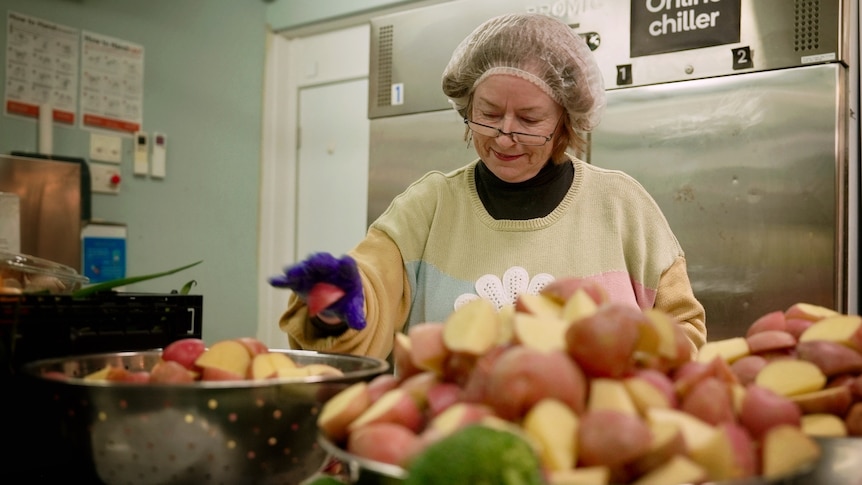Stephanie Smail: There are calls to reform the age pension to support older Australians working in physically demanding jobs. Australian workers need to wait until the age of 67 to access the federal government’s age pension. But advocates say many of the workers are not able to afford it. Many people working in jobs like trades, nursing or aged care need to retire earlier and should be supported. Kimberly Price reports.
Kimberley Price: For 58-year-old Peita McClenaghan, volunteering to provide meals for those in need has many benefits.
Peita McClenaghan: I’ve worked for 20 years in hospitality and I’ve been a tuck shop manager, so it gets me to keep my skills in check. I do have requirements to do that for Centrelink. Also for me personally, it means that I get to take home a free meal at the end of the day.
Kimberley Price: But constantly working in jobs on her feet day in, day out and lifting heavy items has taken a toll on Peita McClenaghan’s body.
Peita McClenaghan: There was absolutely no way I could continue to do what I did. I was having degeneration in my hips and shoulders.
Kimberley Price: She retrained in business administration but has been unable to find work and is relying on JobSeeker payments to get by. And there’s still nine years to go until she’s able to access the pension.
Peita McClenaghan: I think working to 67, that being the pension age for physical workers, I think it’s completely unsustainable. It’s just too hard. And I don’t think that there’s enough compassion within the workplace for those that, you know, have been doing it for a long, long time.
Kimberley Price: Peita McClenghan is not alone. Sixty-year-old Paul Quealy has worked as a carpenter and labourer all his life and is physically unable to work full time now.
Paul Quealy: I’ve recently had checks on my knees and that and the cartilage is worn out in my joints, including in my shoulder. It’s due to carrying heavy weights, etc.
Kimberley Price: He believes there should be changes to the age pension for physical jobs.
Paul Quealy: Look, I think realistically for building workers, yeah, and brickies, electricians even, we’re going up and down ladders all the time, every day. Yeah, the pension age should be possibly around 62.
Kimberley Price: Professor Gary Martin is a workplace specialist at the Australian Institute of Management. He says reform is needed and it could include staggered pension ages, occupation specific provisions or partial pensions for those unable to continue working full time.
Professor Gary Martin: By actually talking about a set, if you like, age for the pension, it doesn’t recognise occupational wear and tear. You can imagine someone who has a physical job struggling at the age of 67 while someone in a white collar type of arrangement might want to work to 75.
Kimberley Price: Professor Martin says not all workers can rely on superannuation to help bridge the gap.
Professor Gary Martin: You know, someone in their 55s, if you look at the average super, it’s $200,000, $350,000. And that’s got to last not only to pension age, but it’s presumably meant to last for a lifetime.
Kimberley Price: Warren McKeown is a teaching fellow at the School of Accounting at the University of Melbourne. He says the current disability and unemployment pensions do provide flexibility to workers unable to work until 67. But there are income caps in place.
Warren McKeown: Now that might pay a bit less. It is a saving to government that they would keep people on lower pension or lower benefits until they reach age pension.
Kimberley Price: But Warren McKeown believes with Australia’s ageing population, a review of the pension system is needed.
Warren McKeown: In terms of equity for many people who are contributing to society and the community over in the economy over a long period of time, that we probably should recognise their contribution.
Kimberley Price: A spokesperson for the Department of Social Services has told the ABC the age pension eligibility was set consistently across the community and the government has no plans to change this.
Stephanie Smail: Kimberly Price and Fiona Blackwood with that report.

